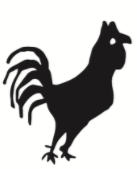Leah Gordon, Kanaval: Vodou, Politics and Revolution on the Streets of Haiti
(London: Soul Jazz Publishing, 2010), ISBN: 978-0-9554817-3-4. £19.99/$39.99
To most westerners today, the word Carnival would probably evoke the dazzling glamour of Rio or the slow-moving floats and throbbing sound systems of Notting Hill. The carnival of Jacmel, revealed to us by Leah Gordon’s photographs, seems to belong to another world.
The images deliberately negate the expectations aroused by the title: in place of the spectacle, we have subjects that look back at us; in place of colour, we have a washed-out black-and-white that evokes a kind of ‘darkness at noon’; in place of the glamour, we have a reality revealed in tatty close-up; eschewing the spontaneous, Gordon poses her subjects down some quiet back street, away from the gaze of the crowd, and asks them to look at her/us. A very few of the costumes are elaborate (the huge papier mâché heads for which Jacmel is famous), most are schematic and indicative: take an old, grubby suit, pin on a few bits of crepe paper and you have a Chaloska: the very embodiment of military brutality.
The images are not so much complemented by, as contrasted with two different kinds of text: first, five excellent essays by subject specialists that explain how carnival performs history, myth, religion, perpetually renewed battles between good and evil etc.; second, twenty ‘oral histories’ elicited by Gordon from the performers. Here, the erudite, external commentary on the characters is replaced by an endotic understanding (‘I saw a donkey dressed like this in a dream, and that is why I do this year after year’).
The book imparts an uncomfortable truth: this is not another world or someone else’s history: the eyes that stare at us from behind the masks force us, above all, to look at ourselves.


